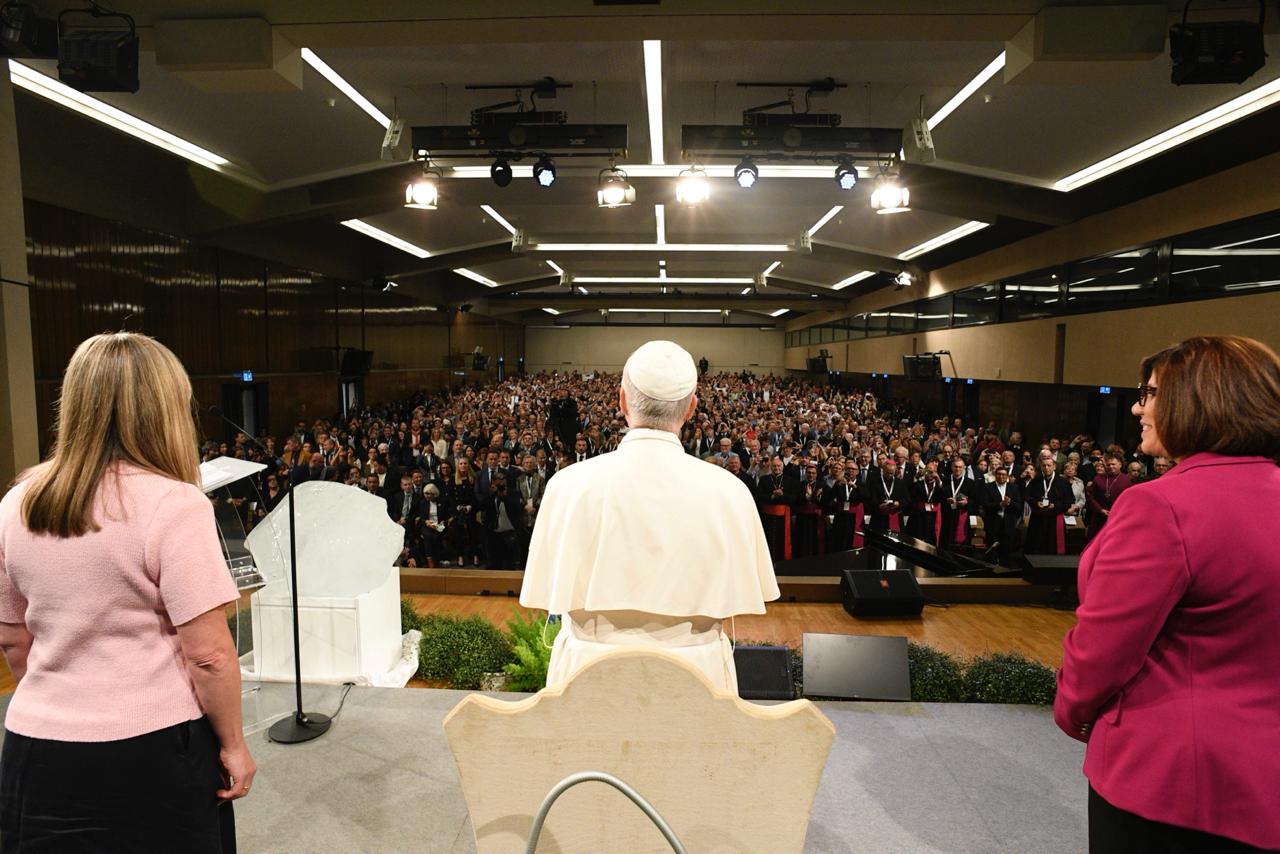The third and final day of the Raising Hope Conference unfolded with new keynote addresses, moments of reflection, prayer, music, and a defining moment: participants’ contributions and commitments, presented as key pillars for climate justice action.
On the website raisinghope.earth/action/ conference participants, both in person and online, were invited to share their own commitments: How will you respond to the cry of the earth and the cry of the poor? These People-Determined Contributions (PDCs) are a bold global civil society initiative to present the pledges of individuals and grassroots communities towards ecological transformation.
Raising Hope water will reach COP30
The moving opening ceremony led by Pope Leo XIV last Wednesday—when he blessed a block of ice from Greenland—reached its culmination this afternoon as participants collected the melted water to take to their homes and communities.
Dr. Lorna Gold, Executive Director of the Laudato Si’ Movement, expressed with emotion: “A block of ice blessed by the Pope has gone viral these days. Now this blessed water will become something very powerful, because it will be carried to COP30 in Brazil.”
Each participant was able to take a bowl containing some of this blessed water—partly from the glacial ice, mixed with water from rivers across the world that had been offered by representatives at the start of the conference. This was not just a gift, but a sign of the urgency of the climate crisis, marked by the hope carried through the Pope’s blessing.
Returning to the heart and raising our voices
Another highlight of the closing day came when Dr. Lorna Gold presented some of the commitments made by participants. Among the most significant were the power of collaboration, the importance of alliances, the call to return to the heart, and the promotion of the Laudato Si’ Animator Program developed by the LSM.
She emphasized the importance of implementation: “We cannot wait for others to act. We must implement the changes that are within our hands,” Dr. Lorna affirmed. She encouraged participants to raise their voices together in Belém, Brazil (next COP), where a new alliance for the non-proliferation of fossil fuels will also be launched.
Giving thanks for 10 years of the LSM
A deeply moving moment came as participants gave thanks for the ten-year history of the Laudato Si’ Movement, founded in January 2015. Dr. Lorna Gold recalled meeting co-founder Tomás Insua in that same year and being struck by his passion and energy to spread the values of the encyclical.
“The most extraordinary thing about our movement is joy,” she declared, urging everyone to “bring this joy to COP30.” She recalled Pope Francis’s words inviting us to “sing along the way,” because “our concern must not take away our joy or our hope.”
Yeb Saño, Chair of the Board of the Laudato Si’ Movement, urged participants to engrave into memory what had been lived during the conference so that “all these reasons push us out of bed every morning.” “We have a lot of work ahead, but Pope Leo is on our side. It’s not about rushing forward, but about moving together.”
Laudato Si’ for courageous communities
The morning opened with a keynote by Kumi Naidoo, Chair of the Fossil Fuel Non-Proliferation Treaty, who described himself as a “prisoner of hope.” He stressed that we must care for our environment because “there are no jobs or humans on a dead planet.”
“Catholic communities, through Laudato Si’, have shown courage,” Naidoo said, encouraging all to act with wisdom and faith, with a sense of urgency. “Hope is not love; hope is resilience, hope is a mission.”
The resilience of peoples
The next panel, titled “Faith and Shared Mission for a Resilient Planet,” was moderated by Josianne Gauthier, Secretary General of CIDSE (Coopération Internationale pour le Développement et la Solidarité). Key topics included financing for developing countries and resilience as the driving force to move forward.
Dr. Maina Vakafua Talia, Minister of the Interior, Climate Change and Environment of Tuvalu, noted that while her native language has no word for resilience, her people have learned to “move from vulnerability to strength” after enduring multiple climate catastrophes. She also emphasized the importance of spirituality in building a resilient future.
Dr. Svitlana Romanko, founder and director of Razom We Stand, spoke of her country, Ukraine, and how fossil fuel dependency as a consequence of war has devastated its people. She stressed that resilience is what keeps them standing today, together with renewable energy and green economies, proving that living on clean energy is possible.
Mons. Robert Vitillo, from the Dicastery for Promoting Integral Human Development and the Laudato Si’ Action Platform, contributed with a reflection from the Gospel: “We are taught about solidarity, and we must shift perspective to translate it into action in our commitments.”
Listening to the peripheries
In the afternoon, the final panel was moderated by Bianca Pitt, founder of the Women’s Environment Network and co-founder of SHE Changes Climate. It revolved around what our hearts tell us about the experience of these past days.
Catherine Coleman Flowers, MacArthur Fellow and advocate for environmental health, member of the boards of the Natural Resources Defense Council, shared how people on the margins are the ones who suffer the most and are least heard.
Bishop Ricardo Hoepers, Secretary General of the National Conference of Bishops of Brazil, reflected on his country’s diversity and how it is necessary to step out of our comfort zones to broaden our horizons: “My dream for Brazil is to unite Laudato Si’ and Fratelli Tutti; and for nature and human beings to hold the same importance: nature is the space God has given us to live as brothers and sisters.”
Before concluding, participants joined in a final session of prayer and reflection, led by members of Trócaire. After presenting a video summary of the three-day journey, all were invited to recall the most significant moments and to solemnly commit to continuing the path, advocating for our common home.


